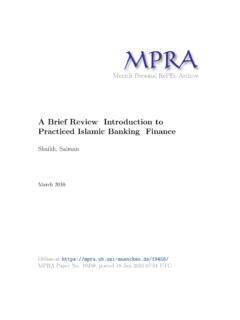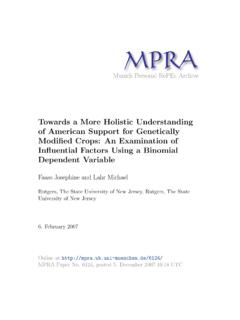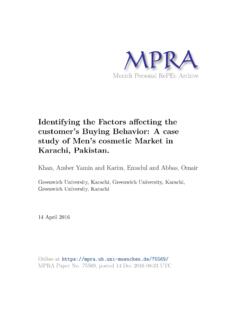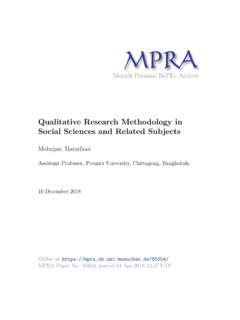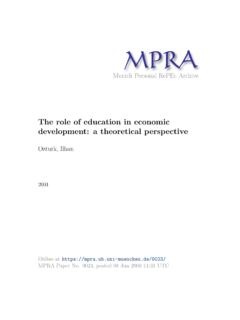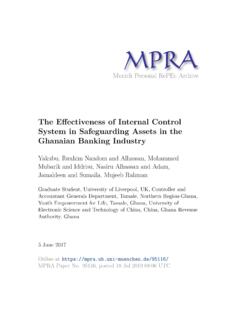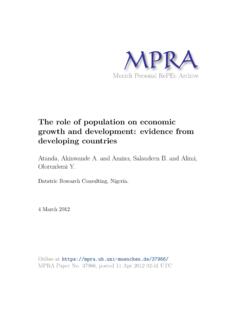Transcription of FISCAL POLICY AND ITS ROLE IN ENSURING ECONOMIC ... - …
1 Munich Personal RePEc ArchiveFiscal POLICY and its role in ensuringeconomic stabilityPopa, Ionela and Codreanu, DianaUniversitatea Constantin Brancoveanu - Facultatea de ManagementMarketing in Afaceri Economice Rm. Valcea15 February 2010 Online Paper No. 20820, posted 19 Feb 2010 23:34 UTC FISCAL POLICY and its role in ENSURING ECONOMIC stability Popa Ionela Universitatea Constantin Brancoveanu , Pitesti, Facultatea de Management Marketing in Afaceri Economice, Rm. Valcea Codreanu Diana Universitatea Constantin Brancoveanu , Pitesti, Facultatea de Management Marketing in Afaceri Economice, Rm. Valcea Key words: FISCAL POLICY ,fiscality, ECONOMIC stability JEL Classification : G32, G38, H50 ABSTRACT The State, irrespective of its institutional nature and contents throughout history, has been the most important answer or, better said, the best-structured solution of society members to the issues of their world s complexity.
2 Processes such as globalization and integration, individuals increasing reliance upon technology, limited vital resources in order to ensure normal life, social polarization growth, poverty augmentation, migrating flows, occurrence of diseases that can rapidly spread at world level all the above increase the complexity of our world and make the State s ECONOMIC involvement compulsory. In this respect, an important role is held by the FISCAL system, originally created to meet strictly financial goals of the State but subsequently enriched by various ECONOMIC and social objectives due to the development of human society.
3 Fiscality can be viewed as a prerequisite to compensate gaps and for a genuine European POLICY of ECONOMIC growth. The impact of fiscality upon society members in every economy is significant, with tax payers acceptance or refusal having a major effect upon the State s intervention by typical means in the entire activity of a society. The paper suggests a analysis of fiscality in Romania. Romania suffers from the lack of self-image and the factors generating it are also to be found in the present paper. 1. Introduction The building and the expanding of the European Union from 6 to 27 member states was a process developed in 50 years.
4 In 1957 the European Community was founded in only six countries, but the next stages reached 27 states with Romania and Bulgaria that joined at the 1st of January assessment of the role and place of Romania in the context of the regional and between the regions cooperation must leave from the new dimensions of the globalise process of regional integration, from the fast changes on the scale of the geo- ECONOMIC positions and from the world strategies taking into account that in the current wave of globalising, the performing economies prove to adapt fast to the world economy. The FISCAL systems represent a key factor to influence the efficiency of the economy.
5 Many researches were done in the FISCAL area both in our country and at an international level. The focus on the impact of the FISCAL factor over the budget and the ECONOMIC development in the integration context and the issue of some scientific elements in this area was not achieved priviously. In the conditions of a new stage Romania a member state of the European Union, the integration of the Romanian FISCAL system in the European FISCAL system becomes a necessity. After 2the integration in the European Union, all the world faces a new FISCAL system : the administration FISCAL offices must take into account the European juridical prudence the courts must understand and apply the communitarian rights, the authorities must respect the FISCAL European law.
6 No at last, the business people must integrate into a FISCAL system where they have to give up childish methods related to the off-shores and must understand the civic spirit and participate to the financial effort of the community. For the EU as a group of states and as a sample of the ECONOMIC globalising, the FISCAL system has a strong influence over the ECONOMIC processes that occur in this structure and in each member state. It is well known that the FISCAL systems are a key factor in the influence over any economy. They determine the increasing of savings, investments and work, with influence upon the production efficiency, the labour force that represent essential elements in the ECONOMIC strategy that make the FISCAL reform a very important component of the ECONOMIC reform.
7 Romania crosses a period when the FISCAL reform is in development. The main purpose is to eliminate the failures of the former reforms and to give efficiency and balance that characterize the optimal FISCAL systems. Romania is also involved in a process of European integration where a major element is the adjusting of the FISCAL legislation by taking into account the social, political and ECONOMIC structures of the country. These aspects offer the article a current context, that will be useful both theoretically and practically in further scientific investigations as a consequence of the complexity of the FISCAL problems related to this thesis. The research theme counts with a large area of problems regarding the FISCAL system in our country with its main two piles the direct taxes and the indirect taxes, the Law 571/ 2003 regarding the FISCAL Code and the implications of the unique tax, the ECONOMIC reforms and the implications of the FISCAL policies upon the ECONOMIC development in the EU.
8 Such a complexity allows the identification of fundamental elements in this research. So the FISCAL factor can be considered as fundamental in this research regarding the impact over the stability of the ECONOMIC development. 2. The role of FISCAL POLICY The role of FISCAL POLICY the national government s planned, discretionary balance between its outlays and recurrent revenues (broadly, spending and taxes) has long been a subject of debate and controversy in modern times. During the 20th century, for a time at least, a Keynesian view of the role of FISCAL POLICY supplanted the more traditional conservative view. The latter view took as its benchmark a rather thorough-going commitment to the maintenance of a balanced budget aggregate spending being restricted to the size of aggregate recurrent revenue with a view to the objective of sound management of the government sector s balance sheet.
9 Or to put the same point differently, budgets were to be framed with a view to prudent management of the State s assets, financial liabilities and net worth generally with a presumption in favour of small government . This approach does not inexorably lead to the POLICY conclusion that there ought to be continuous annual balancing of outlays and recurrent revenue: it is consistent, for example, with balancing the current budget (recurrent expenditures equal to recurrent revenues), while funding capital expenditure with issue of financial liabilities (government debt). For in this way, at least if sensibly done, the value of assets would increase with the extent of financial liabilities, with no deterioration in the public sector s net worth.
10 Nevertheless, in practice the credo of the balanced budget was the common mantra. And in truth, the illiquidity of government assets, and their commonly non-revenue-generating character, means that funding assets with debt is not a straightforwardly viable financial exercise. The role of FISCAL POLICY in developed economies is to maintain full employment and tabilize growth. In contrast, in developing countries, FISCAL POLICY is used to create an environment for rapid ECONOMIC growth. The various aspects of this are: 1. Mobilisationm of resources: Developing economies are characterized by low levels of income and investment, which are linked in a vicious circle .
